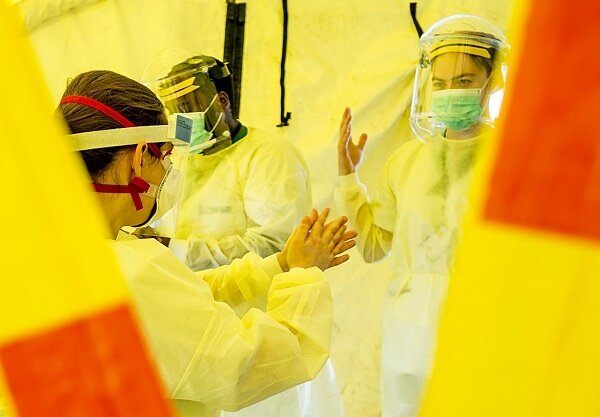The spread of the corona virus had slowed sharply even before the government introduced the most radical measures on March 12, new analyses show.
“We know today that it is likely that the measures that were implemented before March 12 also worked,” Norwegian Institute of Public Health (FHI) director Camilla Stoltenberg told NTB.
She refers to a new risk assessment that was presented on Thursday evening. It appears that the infection rate (R) probably had already dropped from 3.1 to around 1.1 when the most comprehensive peacetime measures were implemented on March 12.
Thus, it did not take much to push the infection rate below the “magic” R-limit of 1.0.
New knowledge
“What we had at the start was a very fast, very big increase. But we did not have high numbers. We didn’t get that until after the measures were implemented,” says Stoltenberg, who emphasizes that FHI did not have reliable data at that time. It is only in hindsight that it has emerged that the rate of infections started to decline already before March 12.
“Now we have clear indications of that. And then it continued to fall,” says Stoltenberg.
The rate of infections shows how many people each corona infected individual passes the virus on to, on average. The total number of infected will increase as long as the number is higher than 1.0. Conversely, the total number of infected persons will decrease when the figure is lower than 1.0.
Today, the number of infections in Norway is down to an estimated 0.49. But when the infection first came to Norway, it may have been up to 3.52.
Small effect of hard action
The new analyses from FHI also reveal that the measures that were introduced first have probably had a greater effect than many of the measures that were introduced on March 12.
The early measures were simple hygiene advice such as frequent hand washing, coughing into the elbow and avoiding handshaking, kissing and hugging. In addition, testing and isolation of infected persons, as well as infection tracking and quarantine for persons who had been in close contact with infected persons, were implemented, which FHI believes has had a great effect.
FHI’s verdict on the measures introduced on March 12 varies.
Several of the measures – especially the closure of kindergartens and elementary schools – FHI believe has had little effect, while the social and economic damage effects have been enormous, with hundreds of billions in crisis packages and more than 400,000 Norwegians in the Nav queue.
Political pressure
Prime Minister Erna Solberg (Høyre) acknowledges that there was a great deal of political pressure that caused the government to shut down on March 12.
“Yes, there was pressure to close, but this whole path has been a learning curve, both for us politicians and for the professionals. Then it may well be that we have made mistakes along the way,” Solberg tells NTB.
– How realistic is it that there will be a new shutdown for any new outbreaks of infection?
“We can tighten again if the infection starts to go up. But we hope that quarantine, isolation and intensive testing can mean that we do not have to shut down as much as in this round.”
FHI: Will last for many years
In the risk assessment, the FHI emphasizes that the population must be prepared for the long-term corona epidemic. “It’s several years until this epidemic is over!” the researchers write.
FHI estimates that 51,000 Norwegians have been infected, of which 15 per cent of cases have been confirmed. The low number means that few have become immune.
“It is very likely that we will catch flare-ups, because there are so few that have been infected,” says Stoltenberg.
But through testing and monitoring systems, it will be possible to stop an outbreak before the spread becomes rampant, the FHI chief believes.
© NTB Scanpix / #Norway Today





Be the first to comment on "Infection was already slowing before March 12"